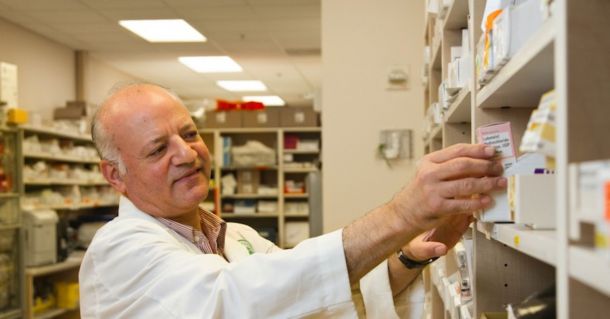Upselling and Cross Selling Dietary Supplements to Add Value to Your Customers – and Your Business

First Financial Bank
Every interaction you and your staff have with your pharmacy customer is an opportunity to bring individual value and service to their experience. Alongside that effort, you can simultaneously realign your focus by educating your customers about supplements through cross-selling and upselling.
As an independent community pharmacy, you are competing with big brand name pharmacies along with one of the most significant players in the field, Amazon. However, the advantage you have is your community and the opportunity to educate them while cross-selling and upselling. Your recommendations have value. Understanding and using the concepts of cross-selling and upselling can increase your wallet share to remain profitable.
There are various ways to use these, and focusing on supplements makes sense. The global market for dietary supplements is estimated to be 155.2 billion in 2022 and is projected to grow to 220.8 billion by 2027. In 2020, the supplement market netted $9 billion in sales in the US, and 77% of Americans take supplements.
So how can you leverage upselling and cross-selling techniques to increase supplement sales? Understanding the difference between the two is the first step. Next, keep updated on market trends for supplements. What is hot now may be replaced by something else in the future. Educate yourself and your staff about which supplements are best sellers so you can successfully target your efforts.
Cross Sell vs. Upsell. What is the Difference?
Understanding the difference between cross-selling and upselling will help you decide which might be a better technique to use for specific sales. And you can always use both if it doesn’t pressure the customer too much. For example, typically, upselling upgrades the consumer to a higher profit margin product, while cross-selling may not always increase the margin but increases the average value of the order by adding additional products. Let’s look at the difference between cross-selling and upselling.
Upselling:
- encourages customers to upgrade or include add-ons to the product or service they’re buying. The product or service you promote is typically a more expensive product or add-on that can increase the overall order value.
- convinces the buyer to purchase a higher-value product’s better or newer version.
- involves educating and communicating the benefits of the higher premium-priced item, including add-ons.
- may mean offering discounts for multiple purchases of the same product.
- encourages name-brand supplements that have a higher cost.
Cross-selling:
- is the recommendation of additional products to be purchased in combination with the main product.
- encourages customers to purchase products or services in addition to the original items they intend to purchase.
- items that are complementary to one another, so customers have more of a reason to purchase both of them.
For example, many prescription drugs cause unwanted side effects, such as nutritional deficiencies. Staff can cross-sell vitamin supplements that may relieve these symptoms. Or, if your customer purchases vitamin D, this may be an opportunity to suggest magnesium to ensure proper absorption. Of course, you also need to take into account any potential interactions or dietary restrictions that would be contraindicated for this customer.
How to Upsell in Retail
You can think of upselling in retail, regardless of product or service, as having specific strategies. Upselling is generally easier than cross-selling since the customer is already committed to purchasing a product. These strategies can be adapted to pharmacy use and tweaked to fit your business model:
● Set sales goals but keep them within reach. To determine your goals, you must know how your business currently performs and set realistic upsell sales targets.
● Ask your customers questions like how and when they plan to use the supplement they purchase. This accomplishes two things: you learn more about their health and lifestyle while building rapport. It also gives you a chance to confirm that this is safe to add to their healthcare regime.
● Placing more expensive best-selling supplements in a prominent place encourages purchasing that item over a less expensive one.
● You can use your point-of-sale location as a test case for supplement impulse buying. Then you can track which supplements are better sellers and tailor your sales efforts around those.

Selling supplements is big business, and there is no reason you can’t get a share of those profits by using tried and true strategies. You know your community best, so tailor your efforts that respect your customers while increasing sales.
Track Trends
Supplements may seem like a moving target at times, with multivitamins at the axis of the supplement wheel. According to the research, there are also variations in buying habits for the different age ranges. You know your customers, and this type of data can help you as you plan for adding value with supplements. Beyond that, paying attention to trends can help you be ready when customers ask questions about a specific supplement they have heard of or seen advertised. They need your insights to better understand if this is appropriate for them.
Review Your Point of Sale Data
Don’t assume you know what supplements sell best in your pharmacy. Verify it, and decide which supplements to focus on. Your pharmacy is unique, and no two pharmacies are alike. What supplements sell in a pharmacy across town could be very different.
Promote to the Right Customers
- Women buy more supplements than men.
- The greatest generation spends more on supplements than any other age group. Next comes boomers.
- Health-conscious consumers buy more supplements.
- Promote to consumers with special diets.
- Consider diabetics and their needs. For example, people who take metformin for type 2 diabetes have lower levels of vitamin B12.
- Patients using prescriptions that leech nutrients may be a target group for supplements.
Stock Up For January First
People make resolutions on January first, most of which concern health. Some of the traditional goals include diet and exercise, so be prepared with advertising and coupons to capitalize on what could be a short time frame.
Keep Supplements Next to the Checkout and On End Caps
Make sure supplements are accessible for customers to see and buy—display supplements near the checkout counter and on end caps. Use signs or brochures.
Training Your Staff to Upsell and Cross-Sell Supplements
All of the planning you do won’t give you results if your staff aren’t properly trained. Keep your training personal and value-based. Your staff is there to provide the extraordinary customer service that will set you apart from big box stores. Some suggestions:
- Create a customer-focused environment that values trust and confidence.
- Educate your staff about supplements and have a process to confirm with you or another pharmacist if there are any questions.
- Train your staff to provide solutions, not sales.
- Train your staff to understand the concepts of upsell and cross sell.
- Use pharmacists’ knowledge by encouraging front-end staff to direct patient questions to pharmacists.
- Create front-end displays of recommended products.
- Ask your staff to greet front-end shoppers and ask if they’re looking for a specific product right away.
- Educate front-end staff on the most popular products, so they know what to recommend.
Your customers rely on your expertise to provide education about all aspects of the drugs you offer. By cross-selling and upselling supplements, you optimize that opportunity to provide what they need while increasing your wallet share.
Looking to discuss your business growth strategies? Let’s talk!

What Do You Need to Know to Buy a Pharmacy?

Pharmacies For Sale: What You Need to Know


